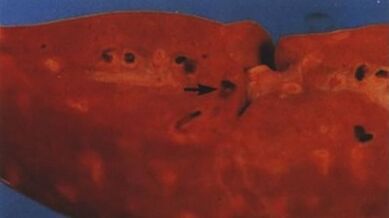Most often, various parasitic organisms affect the organs of the gastrointestinal tract - the stomach or intestines.But these organs are not the only places where worms and other parasites live;they can also affect other areas of the body, including the liver.
Symptoms of infection are the same for all infections - pain in the side, itching, skin rash, yellowing of the skin and mucous membranes of organs, etc.Therefore, determining parasitic infection is not easy because the symptoms are similar to other liver diseases.
What parasites can live in the liver?

Usually, the following types of parasites settle in the liver:
- Roundworm– these parasites enter the liver through the bile ducts from the intestines.The disease, caused by ascariasis, is characterized by itching and rash on the skin, discomfort in the liver area and in some cases nausea and vomiting.
- Giardia- another common parasite that affects the liver.With giardiasis, the patient feels pain in the lower abdomen, nausea and vomiting, jaundice, itching and rash.
- Echinococcus– these organisms cause echinococcosis, in which several worm-containing cysts form in the affected organ.The disease is accompanied by nausea, vomiting, jaundice, and as the disease progresses, the cysts begin to increase in size.
- Opisthorchis– this parasite is common in South Asian countries so vaccination is recommended before visiting them.Opisthorchises parasitize the ducts of the liver and gallbladder and cause serious diseases of these organs.
- schistosomiasis– are also common in South Asian countries, they live mainly in aquatic environments so they can be infected when swimming in lakes and ponds.Schistosomes cause dangerous schistosomiasis, often causing cirrhosis and other diseases.
- Strongyloides– when ingested, they contribute to the development of strongyloidiasis, characterized by pain in the hypogastric region, loss of appetite, jaundice and a bitter taste in the mouth.
- amoeba– with amoebiasis, the liver increases in size many times, forming an abscess.Infected people will experience severe pain in the side, nausea, vomiting and fever.
- chilli– when ingested, it causes balantida, a rarely diagnosed but very dangerous disease.With balantidosis, painful sensations occur in the affected area, aggravated by palpation, the stool is bloody, dry, and the skin is yellow.
- Liver flukes– a worm that affects the hepatic ducts and causes disruption of the functioning of the biliary system, including a disease such as cholangitis.Patients lose appetite, lose a lot of weight, have abdominal and lower stomach pain, increased body temperature, rashes and itchy skin.
Path of infection

Worms can enter the body in the following ways:
- When eating dirty vegetables and fruits.
- When eating raw, undercooked meat.
- When drinking raw and unboiled water.
- When coming into contact with an infected person.
- Through the feces of infected animals.
- Through dirty hands.
- When playing with domestic animals (or on the street).
- When in contact with the ground, the soil contains large numbers of parasitic worms and their larvae.
- When swimming in stagnant water.
The main reason worms enter the body is through the mouth;Some types penetrate the skin.
Diagnose
To determine parasitic infection in the liver, you need to undergo several tests:
- General blood test.
- Biochemical blood test.
- Urine analysis.
- Confidential analysis.
- Biochemical analysis of stool.
- Blood test for the presence of antibodies against parasites - increased levels of them indicate that the body is trying to fight the worms on its own.
- Stool analysis.
- Ultrasound of the abdominal cavity and liver will show the presence of tumors, abscesses, liver size and other factors that indicate the presence of parasites.
Treatment
When removing helminths you need to remember one important rule:Do not self-medicate!Necessary therapy is prescribed only by a doctor, based on the type of parasite, degree of damage and other indications.Self-medication has many serious complications and death.
Helminth treatment aims to:
- Eliminates the consequences of poisoning the body.
- Eliminate parasites from the body.
- Improves enzyme activity of the liver and intestines.
- Prevent further infections.
Regardless of the type of disease, infected people must follow a diet.Fatty, fried, spicy, salty foods, flour, and sweets should be excluded from the diet.
You need to consume as much fiber as possible, which is found in cereals, lean meat, stewed, pre-heat-treated vegetables and dairy products.Drink water regularly, clean, filtered or boiled as much as possible.
Patients are prescribed drug treatment:

- Anthelmintic medicine– Kills and removes parasites from the body, preventing further infections.
- Absorbent– these products “collect” all the harmful substances that poison the body and remove them from the body.Thanks to this, the entire gastrointestinal system is completely cleansed, including the liver and its ducts.
- Anti-diarrheal medication– Diarrhea often occurs when infected with helminths, so use anti-diarrhea drugs to eliminate it.
- Anti-allergic drugs– when infected with parasites, various allergic reactions occur in the form of rashes, burning, itching of the skin.To eliminate allergies, antihistamines are prescribed.
- The drug normalizes liver function– they strengthen the liver cleansing effect and promote the regeneration of damaged cells of the organ and normalize its function.
- Vitamin and mineral complex - restores the balance of nutrients in the body.
Prevent infection
It is very easy to get infected with parasites, so to prevent infection, you need to remember the following important rules:
- Wash your hands as often as possible, especially after playing with animals, working in the dirt, going to the bathroom, and going outside.
- When working with soil, only wear protective gloves.
- Consume only thoroughly washed fruits and vegetables.
- Do not drink raw water.
- Boil or fry the meat thoroughly.
- Do not swim in stagnant or unfamiliar waters.
- Before visiting other countries, get vaccinated against parasites common in the area.






































